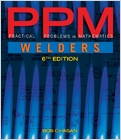Description: Now you can combine a highly effective, practical approach to mathematics with the latest procedures, technologies, and practices in today's welding industry with PRACTICAL PROBLEMS IN MATHEMATICS FOR WELDERS, 6E. Readers clearly see how welders rely on mathematical skills to solve both everyday and more challenging problems, from measuring materials for cutting and assembling to effectively and economically ordering materials. Highly readable explanations, numerous real-world examples, and practice problems emphasize math skills most important in welding today, from basic procedures to more advanced math formulas and technologies. Readers leave equipped with the strong math tools they need for success in today's welding careers. Product Benefits: - UPDATED EMPHASIS demonstrates how to use math to solve everyday challenges and ensure efficiencies. Today's welders rely on mathematics every day to solve problems from measuring materials for cutting and assembly to ordering product and planning ahead for the most economical use of materials. Clear, updated coverage of the latest technologies, procedures, and techniques for math in welding today helps prepare students to offer future employers exceptional skills.
- NEW SECTIONS address math skills to maximize today's tools. This edition offers new, detailed coverage on use of calculators, micrometers and calipers, multipliers, and pipefitting take-offs to prepare today's learners for on-the-job success.
- EXPANDED EXERCISES further emphasize effective measuring tape use. This edition provides additional coverage and expanded exercises highlighting the most effective use of common measuring tools -- including the measuring tape, which can be a frequent problem area for many students and practicing welders.
- DETAILED EXPLANATIONS AND EXERCISES ON ANGULAR DEVELOPMENT further prepare students for today's work environment. This edition offers more detailed explanations and specific new exercises in Section 7 to address angular development and measurement and to ensure students have mastered important skills in these areas.
- EXPANDED GLOSSARY ensures your students understand and can easily reference today's most current math and welding terms. This edition provides an expanded glossary that highlights today's most common terms, including metal properties and characteristics.
- ADDITIONAL PROBLEMS AND EXERCISES throughout this edition provide more opportunity for practical application. In response to the requests of today's welding instructors and students, this edition now offers numerous extra or expanded real-world math problems and exercises to better prepare today's students for the work environment.
- UPDATED QUESTIONS address math challenges specific to today's latest welding technologies. Today's welding technologies can quickly change and constantly evolve. In response to these developments, this edition highlights new questions that cover the challenges specific to today's newest technologies.
- MEANINGFUL, CLEAR ILLUSTRATIONS--NOW MORE THREE-DIMENSIONAL—assist students in visualizing concepts. This edition's enhanced, numerous illustrations offer more dimensional images to help readers clearly visualize weldments, specific projects, and how key mathematical concepts apply to the trade.
- LATEST EXAMPLES AND PROBLEMS provide a current snapshot of math concepts most important in welding today. Updated examples and practical problems throughout this edition help students master and apply the math skills required in today's welding industry. Students gain a realistic understanding of what to expect in the profession.
- NUMEROUS, Step-by-step examples ensure student understanding. Proven, effective step-by-step examples throughout this edition encourage your students to follow each procedure closely, ensuring comprehension as they progress throughout the text.
- EASY-TO-FOLLOW UNITS are helpful for learning at all levels of math proficiency. This book's easy-to-read, clear explanations and manageable units have earned praise from current users and reviewers. The book's presentation is ideal for learners who may struggle in math as well as accomplished math students who simply need a refresher in the necessary math skills.
Table of Contents: Part 1: WHOLE NUMBERS
1. Addition of Whole Numbers
2. Subtraction of Whole Numbers
3. Multiplication of Whole Numbers
4. Division of Whole Numbers
Part 2: COMMON FRACTIONS
5. Introduction to Common Fractions
6. Measuring Instruments: The Tape Measure, Caliper, and Micrometer
7. Addition of Common Fractions
8. Subtraction of Common Fractions
9. Multiplication of Common Fractions
10. Division of Common Fractions
11. Combined Operations with Common Fractions
Part 3: DECIMAL FRACTIONS
12. Introduction to Decimal Fractions, Rounding, Calculators
13. Addition and Subtraction of Decimal Fractions
14. Multiplication of Decimals
15. Division of Decimals
16. Decimal Fractions and Common Fraction Equivalents
17. Tolerances
18. Combined Operations with Decimal Fractions
19. Equivalent Measurements
Part 4: AVERAGES, PERCENTAGES, AND MULTIPLIERS
20. Averages
21. Percents and Percentages (%)
Part 5: METRIC SYSTEM MEASUREMENTS
22. The Metric System of Measurements
23. English-Metric Equivalent Unit Conversions
24. Combined Operations with Equivalent Units
Part 6: COMPUTING GEOMETRIC MEASURE AND SHAPE
25. Perimeter of Squares and Rectangles, Order of Operations
26. Area of Squares and Rectangles
27. Area of Triangles and Trapezoids
28. Volume of Cubes and Rectangular Shapes
29. Volume of Rectangular Containers
30. Circumference of Circles, and Perimeter of Semicircular-Shaped Figures
31. Area of Circular and Semicircular Figures
32. Volume of Cylindrical Shapes
33. Volume of Cylindrical and Complex Containers
34. Mass (Weight) Measure
Part 7: ANGULAR DEVELOPMENT AND MEASUREMENT
35. Angle Development ... |

